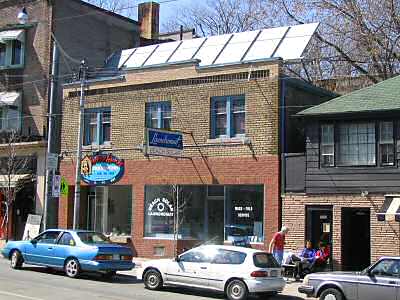Submitted by Norm Roulet on Wed, 11/08/2006 - 15:13.

Dozens of best practices to be learned in this posting... From the North Coast of Lake Ontario comes the following story of an entrepreneur for sustainability in Toronto who has found “There is no longer a paradigm conflict, Renewable energy doesn’t have to cost more”. This entrepreneur, Alex Winch, found his strategy for retrofitting a run-down Laundromat to solar has paid off... "He’s kept prices low—lower than his competition—while tripling revenues and charting an annual 10% rate of return on investment." I'm exploring working with Alex and Toronto-based glass and neon artist Alfred Engerer to use solar and perhaps wind to generate the electricity for a major off-the-grid, hand blown neon installation in Toronto, while, in the big picture, Mondial is looking to go public. As you'll read below, "Alex Winch puts his money where his mouth is and, these days, he laughs all the way to the bank." For all the attention leadership of this community puts on renewable energy, what do we really have to show in the community. Perhaps a NEO Solar Laundromat would be the best next step.
About the Beach Solar Laundromat (note, at their website are nice graphics of monitoring of energy and CO2 savings due to solar installation::
The Beach Solar Laundromat uses eight solar thermal panels to heat water for the Laundromat, potable water for the second floor apartment and for space heating in radiators. The building was built in 1939, and the mechanical retrofit took place in 2002 and 2003. Natural Gas consumption has been reduced by approximately 30% as a result of the energy initiatives undertaken. Revenues grew 160% over eighteen months as customers actively choose the Beach Solar Laundromat because of its environmentally friendly energy initiatives.
 The Beach Solar Laundromat was recognized in April, 2004 by the Canadian Council of Ministers of the Environment as the Best Small Business in Canada for Pollution Prevention and the Best Greenhouse Gas Emission Reduction project in Canada.
The Beach Solar Laundromat was recognized in April, 2004 by the Canadian Council of Ministers of the Environment as the Best Small Business in Canada for Pollution Prevention and the Best Greenhouse Gas Emission Reduction project in Canada.
In September, 2004 the wash and fold service at the Beach Solar Laundromat was recognized by the City of Bremen, Germany with the Bremen Partnership Award. Under the patronage of the United Nations Environmental Programme, the award recognizes profound environmental innovation achieved in partnership with a non-goverment organization.
Canada has supported the solar installation through REDI.
Alex Winch puts his money where his mouth is and, these days, he laughs all the way to the bank. Four years ago, Winch bought a run-down Laundromat in the Beaches and did, he said, what made sense from an engineering and an investment perspective. Retrofitting the building with eight solar panels, he integrated three separate water heaters—electric, oil, and natural gas—and opened the Beach Solar Laundromat. "The operating model behind Beach Solar has proven so successful that he launched Mondial Energy, a global financial intermediary covering the capital costs on solar retrofits. Mondial’s profits derive from the fixed energy rates it charges consumers on a commodity that’s certainly never before been sold in Canada—heat."
There is no arguing Winch’s strategy has paid off. He’s kept prices low—lower than his competition—while tripling revenues and charting an annual 10% rate of return on investment.
“There is no longer a paradigm conflict,” says Winch. “Renewable energy doesn’t have to cost more.”
It certainly didn’t cost him much to get started. Winch built his first solar panel with the aid of a how-to book from the 70s, and he never looked back. The operating model behind Beach Solar has proven so successful that he launched Mondial Energy, a global financial intermediary covering the capital costs on solar retrofits. Mondial’s profits derive from the fixed energy rates it charges consumers on a commodity that’s certainly never before been sold in Canada—heat.
Mondial’s funding comes strictly from private investors. The government, it appears, does little to help Winch.
“They’re actively supporting natural gas consumption,” he says. But he is undeterred and energized by his strategy. To hear him speak, it’s as though he’s uncovered a secret. Run the numbers, and it looks like he has.
“When the sun hits my panel, it doesn’t cost me anything to generate heat…It’s capital intensive, but every unit I create from my solar panels is a pure return on investment…If I’ve got a zero marginal cost of production and a positive value of energy creation, you physically cannot lose money.”
What is missing in Canada, says Winch, is a fair and even playing field, where alternative energy providers may bid on large energy contracts. The alternative energy market here remains so small that Winch’s demand for panels has far outstripped capacity for supply. These days, Mondial employs a German company to engineer and install solar panels at approximately $1000 a piece, to complete retrofits for an international hotel chain, a Nevada Casino, apartment buildings in Toronto, and a handful of other solar projects around the world.
But, for now, Winch remains committed to Toronto. The Solar Beach Laundromat runs a partnership with Neighbourhood Link, employing new immigrants in a wash and fold service providing Canadian work experience while fostering strong language skills.
Winch has imminent plans to take Mondial public. He is interested in wind energy, though he argues it is not yet cost effective, and he is investigating ethanol, which he expects will require significant capital investment—the kind that comes from an IPO.
Though he continues to work on a profitable strategy for individual homes, Winch remains confident that the demand is there. In an energy market characterized by instability, his alternative approach is a financially responsible option for Canadians looking to cut costs while maintaining service.
Wise investors, certainly, would do well to take notice of Alex Winch.